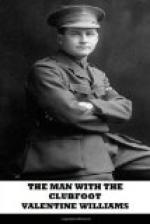The train for Berlin left Rotterdam at seven in the morning. It was now ten minutes past two, so I had plenty of time. From that night onward, I told myself, I was a German, and from that moment I set myself assiduously to feel myself a German as well as enact the part.
“It’s no use dressing a part,” Francis used to say to me; “you must feel it as well. If I were going to disguise myself as a Berliner, I should not be content to shave my head and wear a bowler hat with a morning coat and get my nails manicured pink. I should begin by persuading myself that I was the Lord of creation, that bad manners is a sign of manly strength and that dishonesty is the highest form of diplomacy. Then only should I set about getting the costume!”
Poor old Francis! How shrewd he was and how well he knew his Berliners!
There is nothing like newspapers for giving one an idea of national sentiment. I had not spoken to a German, save to a few terrified German rats, prisoners of war in France, since the beginning of the war and I knew that my knowledge of German thought must be rusty. So I sent the willing waiter for all the German papers and periodicals he could lay his hands on. He returned with stacks of them, Berliner Tageblatt, Kelnische Zeitung, Vorwerts; the alleged comic papers, Kladderadatsch, Lustige Bletter and Simplicissimus; the illustrated press, Leipziger Illustrirte Zeitung, Der Weltkrieg im Bild, and the rest: that remarkable cafe even took in such less popular publications as Harden’s Zukunft and semi-blackmailing rags like Der Roland von Berlin.
For two hours I saturated myself with German contemporary thought as expressed in the German press. I deliberately laid my mind open to conviction; I repeated to myself over and over again: “We Germans are fighting a defensive war: the scoundrelly Grey made the world-war: Gott strafe England!” Absurd as this proceeding seems to me when I look back upon it, I would not laugh at myself at the time. I must be German, I must feel German, I must think German: on that would my safety in the immediate future depend.
I laid aside my reading in the end with a feeling of utter amazement. In every one of these publications, in peace-time so widely dissimilar in conviction and trend, I found the same mentality, the same outlook, the same parrot-like cries. What the Cologne Gazette shrieked from its editorial columns, the comic (God save the mark) press echoed in foul and hideous caricature. Here was organization with a vengeance, the mobilization of national thought, a series of gramophone records fed into a thousand different machines so that each might play the selfsame tune.
“You needn’t worry about your German mentality,” I told myself, “you’ve got it all here! You’ve only got to be a parrot like the rest and you’ll be as good a Hun as Hindenburg!”
A Continental waiter, they say, can get one anything one chooses to ask for at any hour of the day or night. I was about to put this theory to the test.




